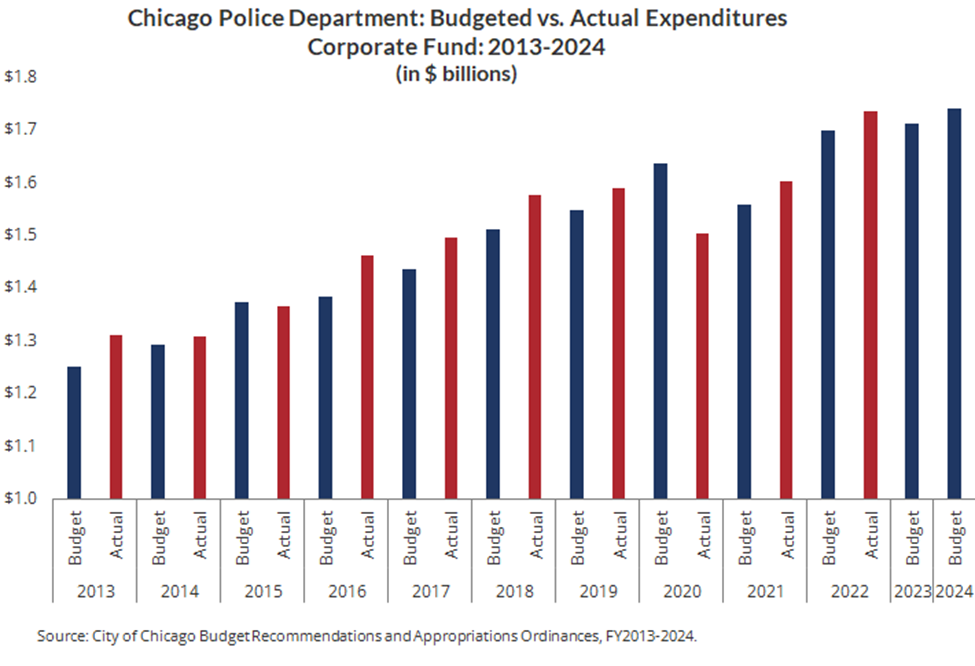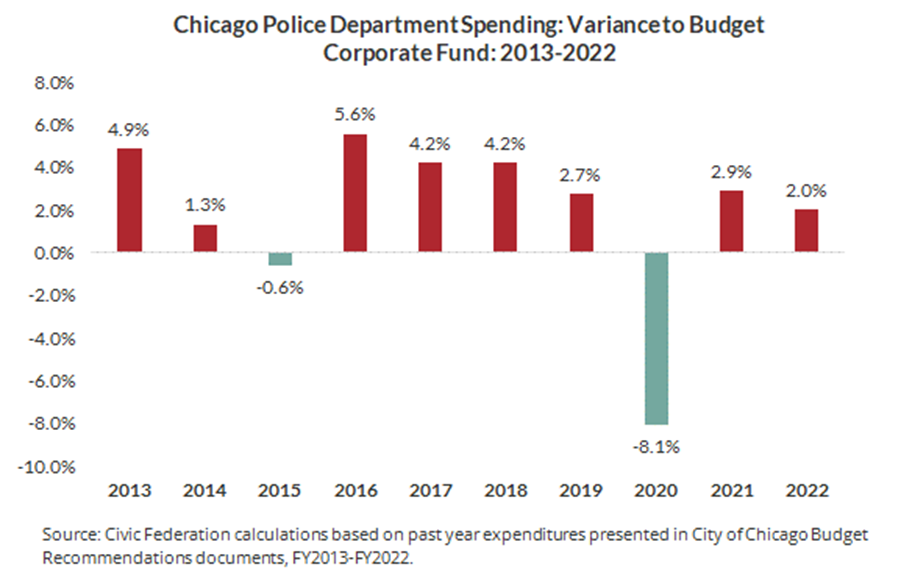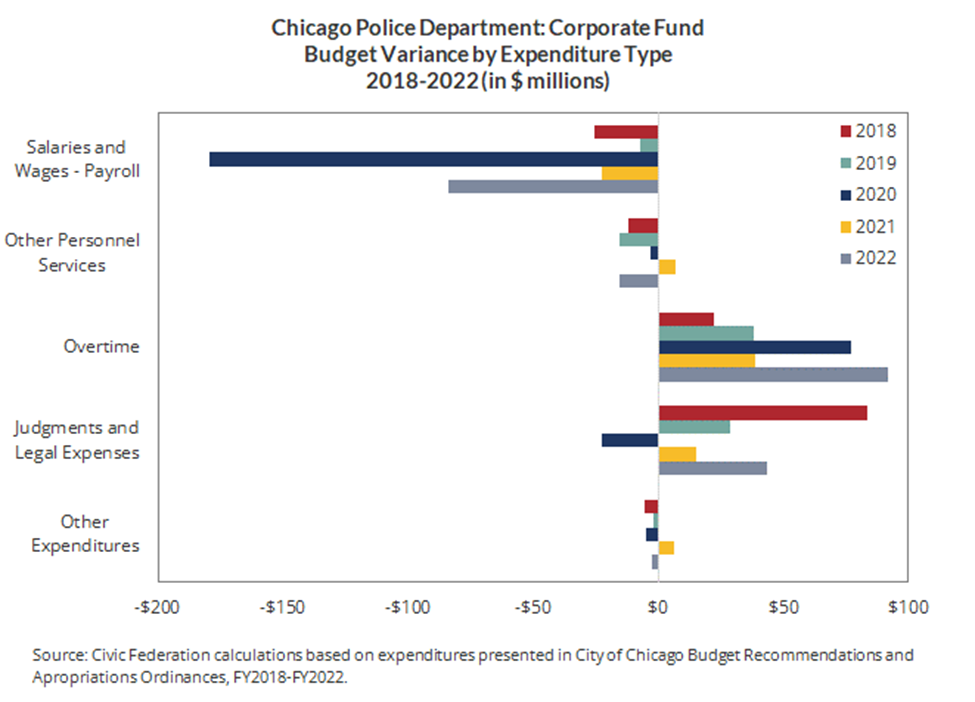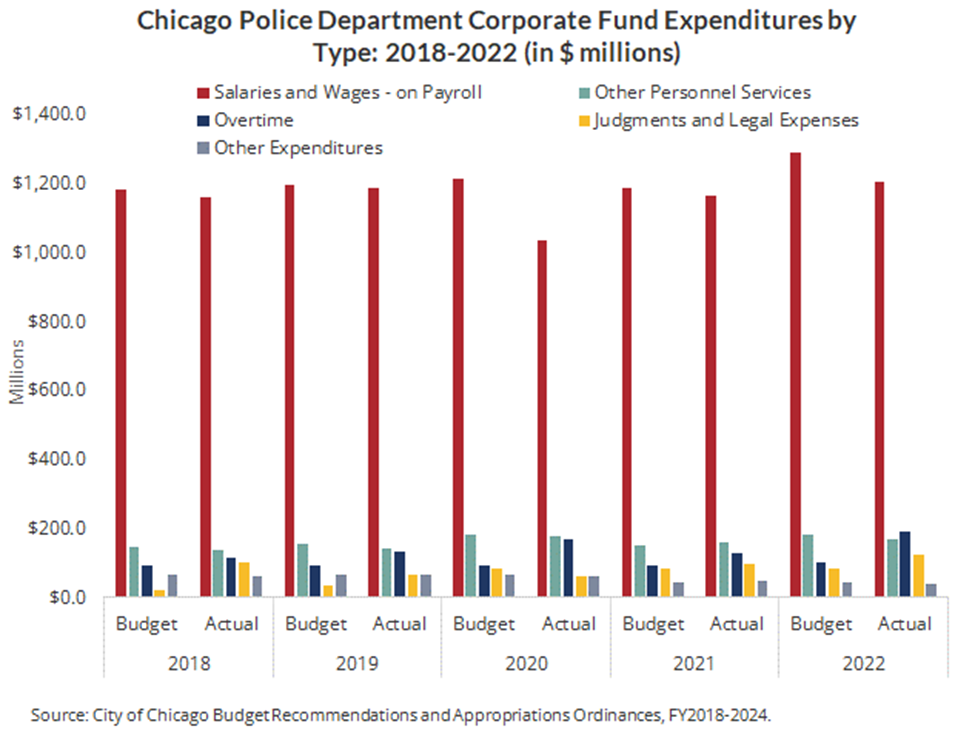January 26, 2024
As part of the total City of Chicago budget adopted for the 2024 fiscal year that began on January 1, the City Council approved a nearly $2.0 billion budget for the Chicago Police Department (CPD). The Police Department budget represents 12% of the City’s total $16.6 billion appropriations for FY2024 across all funds, including grants. Excluding grants, the CPD budget makes up approximately 15% of the City’s full $12.3 billion spending plan across all local funds.
Because nearly all the Police Department’s personnel and spending are budgeted within the Corporate Fund, the City of Chicago’s general operating fund, this analysis will focus solely on Corporate Fund expenditures. The Corporate Fund accounts for 87%, or $1.7 billion, of the CPD’s $2 billion total budget.
The Chicago Police Department budget has grown steadily over the years to keep up with increases in personnel costs. CPD appropriations within the Corporate Fund have increased by nearly 40% since 2018, from $1.3 billion to $1.7 billion. But is this how much the department actually spends each year? What is the variance each year between the originally budgeted amount and how much is spent? Is that variance significant?
Based on past expenditures available in the City’s annual budget recommendations documents, CPD’s actual expenditures have exceeded the authorized appropriation each year since 2013 except in two years: 2015 and 2020. The budget variance in 2015 was quite small—less than 1% below budget, while the budget variance in 2020 was about 8% lower than budgeted (more on why this occurred below). On average over this period, CPD expenditures have been 1.9% above budgeted levels. Budgeted and actual expenditures for CPD within the Corporate Fund between 2013 and 2024 are shown in the chart below.

The variance between actual expenditures and budgeted levels from 2013 through 2024 are shown in the chart below. The Police Department’s expenditures have exceeded the budgeted amount in most years during this ten-year period, ranging from 1.3% to 5.6% above budget. Overtime is a driving factor of CPD expenditures, exceeding budget by 78% on average during this period. In 2020, however, the first year of the COVID-19 pandemic, CPD expenditures were approximately 8% below budget. That year, the Department spent well below budget on salaries, while at the same time spending well over budget on overtime costs. Based on information provided by the City budget office to the Civic Federation, the Department used $282 million in federal CARES Act funding to pay for public safety expenses that qualified under the federal COVID relief legislation, thereby freeing up those dollars for use in other areas of the City budget.

What is driving these budget variances? Looking more closely at the types of expenditures in which CPD is spending more or less than budgeted, CPD has consistently come in under budget on employee salaries (payroll) and over budget in two other key categories: overtime and legal judgments and settlements. Between 2013 and 2022, payroll expenditures were less than appropriated amounts in almost every year, with the exception of 2015. Overtime expenditures have been over budget every year during that period. Expenditures on CPD judgements, legal settlements and other legal expenses have come in higher than budget every year except 2020.
The following chart shows these variances by expenditure type within the five-year period from 2018 through 2022.

By far the largest portion of Police Department spending goes to pay the salaries and wages of CPD employees. In 2022 the Department budgeted $1.29 billion for payroll, but actually spent about $84 million less than that—$1.20 billion. This is likely due to the high number of vacancies within the Department. Based on vacancy rates provided by the City budget office, CPD had an average of approximately 1,600 vacant positions throughout 2022. This trend has continued through 2023 and into 2024. As of January 25, 2024, the Department had 12,329 active employees based on Chicago employee data posted by the Chicago Inspector General. This is only about 87% of the 14,137 full-time equivalent (FTE) positions budgeted in FY2024.
There are also several other personnel services line items in the budget for which actual expenditures have been below budget consistently in recent years. These other personnel services line items include premium pay, specialty pay, comp time, scheduled salary and wage adjustments, duty availability, quarterly payments to supervisors, tuition reimbursement and uniform allowance. Spending on these line items collectively has been below budget in each year between 2018 and 2022 with the exception of 2021, when other personnel services spending came in slightly over budget.
However, CPD has been spending more on overtime than the amount budgeted each year, with the largest increases in overtime spending occurring in 2020 and 2022. The large amount of overtime spending was due to staffing issues related to the COVID-19 pandemic and the departure of officers from the Department, as well as the Department’s struggle to keep up with staffing coverage to respond to protests following the murder of George Floyd in 2020 and to keep up with coverage of large planned events. This overtime spending trend continued into 2023.
Additionally, legal judgments, settlements and other related legal expenses are another category of spending where the Chicago Police Department frequently spends far more than budgeted allocations. In 2018, the Department was only budgeted for $20 million in legal judgments, but actually spent $103.5 million. Historically, the City had budgeted for judgments and settlements outside the Police Department budget, and has also relied on the expensive practice of borrowing through bonds to cover settlements. The Lightfoot administration began shifting these expenses into the operating budget rather than relying on borrowing to pay for settlements and judgments. This more accurately reflects the legal costs associated with CPD lawsuits and other legal matters. But the amount budgeted annually has been insufficient to capture the true cost. The City increased its budgeted appropriation for judgments and legal costs to approximately $60 million in 2019 and 2020, and to $82.6 million in 2021 through 2024. The only year during this timeframe that CPD has not exceeded the budgeted appropriations for this purpose was in 2020, when the City spent $22.5 million less than budgeted, likely due to a slowdown in court activity as a result of the pandemic. This issue is an area of reform the City has struggled to rein in. Reaching compliance with the federal Consent Decree could help reduce long-term legal settlement costs.
All other expenditures make up a very small portion of the CPD budget and have generally not varied significantly from budgeted amounts. These other expenditures include contractual services, travel, physical exams, Consent Decree appropriations, equipment, materials and reimbursements to other departments.
The budgeted vs. actual expenditures for each of these expenditure categories are shown in the chart below.

What happens when CPD spends more than it was budgeted?
Local governments must pass a balanced budget at the beginning of each fiscal year, and then steps are taken throughout the year to monitor revenues and expenditures to ensure that they end the year without expenditures exceeding revenues. Adjustments can be made throughout the year, such as making transfers between funds or accounts with surpluses. If total expenditures do exceed revenues, a government would typically use fund balance remaining from the prior year to pay the difference. At the end of each fiscal year, the City conducts a financial audit that looks at final expenditures and revenues for the year.
Because the Chicago Police Department is one of many departments within the City’s budget, CPD’s expenditures are looked at within the context of the budget as a whole. Within the Corporate Fund (general fund), CPD expenditures may balance out against those of other departments within the Corporate Fund. Throughout the year, the City can make transfers between departments and accounts to ensure the budget remains as close to balanced as possible. If the City foresees a catastrophic situation where revenues are expected to come in significantly lower than expected or expenditures are expected to increase significantly, then steps would have to be taken to reduce expenditures, such as raising taxes or fees, cutting spending in selected areas, hiring freezes or layoffs.
One final note of importance when considering the actual cost of operating the Police Department: the CPD budget by itself does not provide a complete accounting of the total cost of running the Department. This is because of other expenditures that the City of Chicago accounts for in other areas of the budget outside of the department’s budget. The largest expenses that fall outside the CPD budget are pension benefits for police officers and civilian employees and employee benefits (such as healthcare). These are both budgeted for within a catch-all Finance General category of spending. When including these expenses, the real cost of CPD is more like $3 billion, well over the $2 billion department budget.
Additionally, some other costs associated with operating CPD are captured in the budgets of other departments. For example, the Office of Public Safety Administration handles finance, human resources and technology functions for each of the City’s public safety departments. This department is where the CPD’s controversial ShotSpotter (now called SoundThinking) contract is budgeted. The Office of Emergency Management and Communication fields 911 calls, which is central to CPD operations. And other equipment and facilities maintenance for things like police vehicles, helicopters and buildings are handled through the City’s Department of Assets, Information, and Services.
UPDATE: This blog was updated on Feb. 6, 2024 to incorporate additional information provided by the City of Chicago to include actual expenditures on retroactive salaries in 2020 that were not available at the time of publication.
See more of the Civic Federation’s research on the CPD budget:
Chicago Police Department Budget Q&A
What is the Chicago Police Department Budget?

